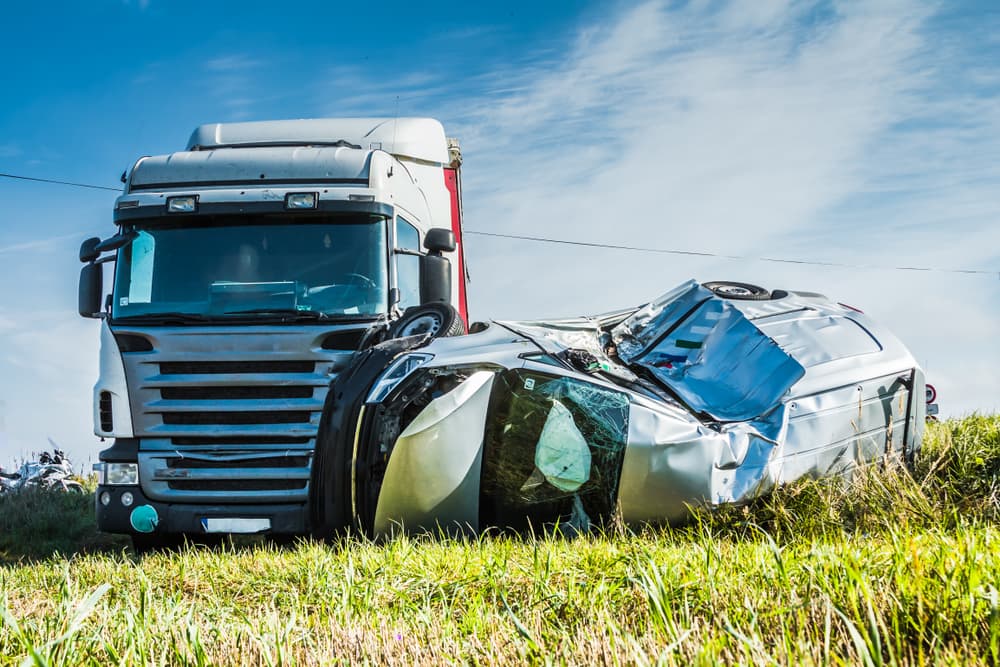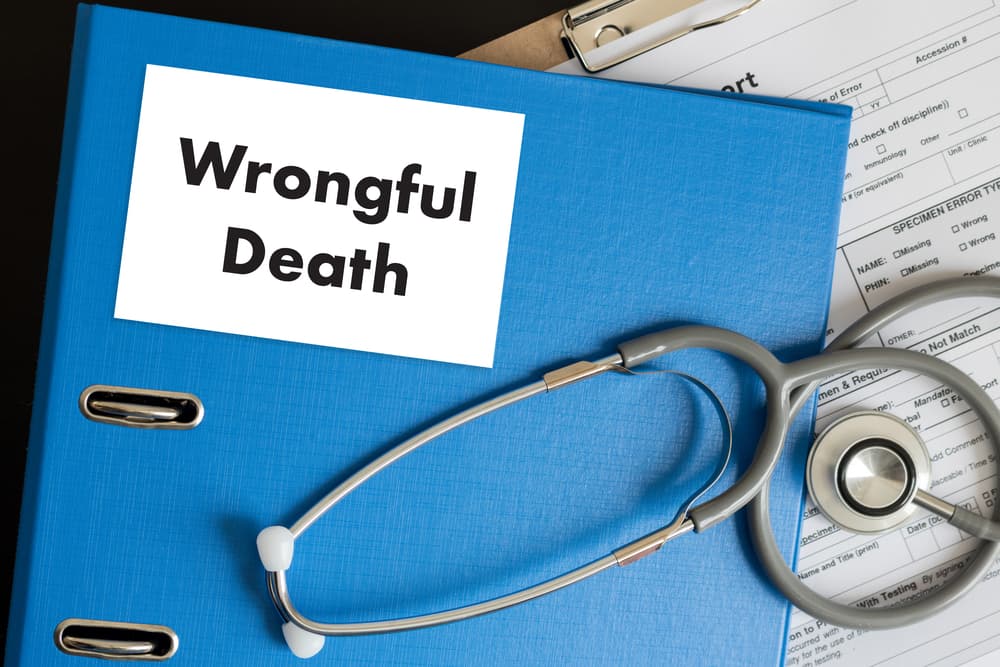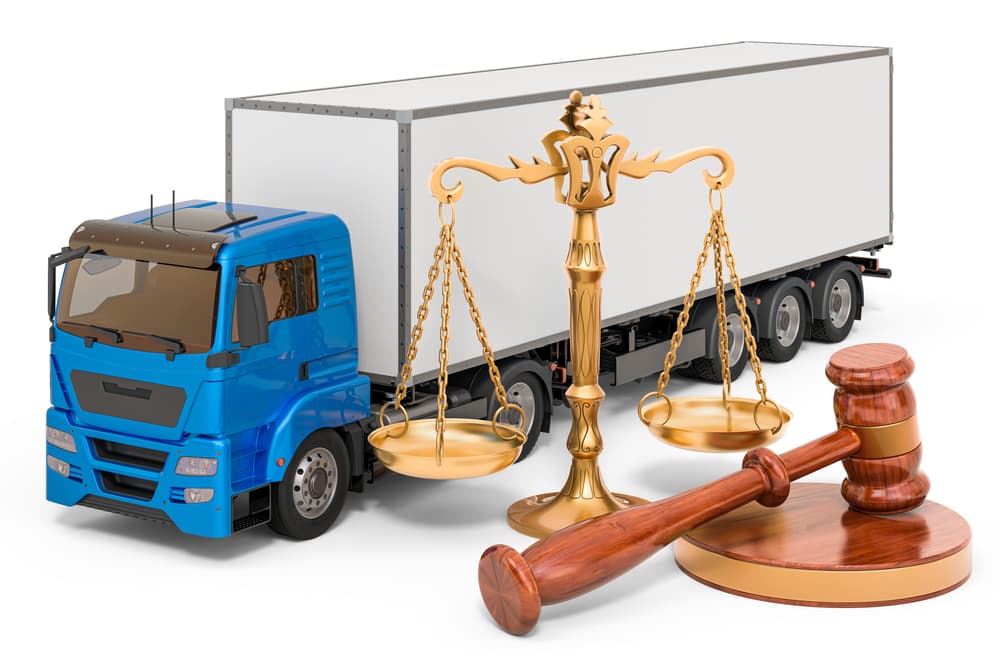
When truck drivers, trucking companies, and others negligently violate traffic laws or motor carrier regulations, fatal accidents may unfortunately happen. If you recently lost a loved one in a fatal truck collision, you may be eligible to file a wrongful death claim seeking various types of compensation. A knowledgeable and compassionate wrongful death lawyer in Edmonton can determine your eligibility for filing a claim and work to secure the compensation that you and your family deserve at this difficult time.
How do Fatal Truck Accidents Happen?
Fatal truck accidents often happen due to negligence by both truck drivers and trucking companies.
- Speeding is a major contributor to fatal truck accidents. Truck drivers may exceed speed limits to deliver goods on time – especially if they are paid per delivery rather than per hour. Speeding reduces a driver’s ability to react to sudden changes on the road and increases the severity of accidents when they occur.
- Truck driver fatigue is another significant factor. Truckers often work long hours and may not get enough rest. Despite regulations that limit driving hours, some drivers push beyond these limits to meet tight deadlines or due to pressure from employers. Fatigue impairs reaction times, decision-making, and overall alertness, leading to severe accidents.
- Distracted driving is also a critical issue. Just like car drivers, truckers can become distracted with mobile phones, eating, adjusting controls, or even daydreaming. Given the size and weight of trucks, even a momentary lapse in attention can result in catastrophic and deadly collisions.
- Impaired driving is a less frequent but equally dangerous problem. Some truck drivers may use alcohol or drugs to cope with the stress and long hours on the road. This impairment drastically reduces their driving ability and significantly raises the risk of fatal accidents.
- Trucking company negligence is another key factor. Companies may prioritize profit over safety by encouraging or even forcing drivers to ignore rest breaks and speed limits. They may also hire inadequately trained drivers or fail to provide proper ongoing training. Poor maintenance of trucks can lead to mechanical failures. For instance, brake failure, tire blowouts, or engine problems can cause accidents, and these issues often stem from insufficient vehicle inspections and maintenance.
- Overloading trucks is another hazardous practice. Companies sometimes load trucks beyond their safe capacity to cut costs, but this makes the trucks harder to control and increases the risk of rollovers and brake failures.
- Lastly, inadequate safety measures and enforcement can contribute to fatal truck accidents. Trucking companies may neglect to install or maintain safety features like proper lighting, reflective tape, and underride guards. Without these measures, trucks are more likely to be involved in deadly crashes – especially in poor visibility conditions.
Proving a Wrongful Death Claim Involving a Truck Accident

Proving a wrongful death claim involving a truck accident requires demonstrating that the death occurred due to the negligence or misconduct of the truck driver or the trucking company. This process requires gathering and presenting solid evidence to support the claim. Here’s how it typically works.
- First, you need to establish the legal duty of care. This means showing that the truck driver or trucking company had a responsibility to ensure the safety of others on the road. Truck drivers are expected to drive carefully, follow traffic laws, and adhere to regulations set for commercial vehicles. Trucking companies are responsible for maintaining their trucks, training their drivers, and ensuring that they follow safety rules.
- Next, you must prove a breach of duty. This involves showing that the truck driver or trucking company failed to fulfill their responsibilities. For instance, if the driver was speeding, driving under the influence, or distracted, they breached their legal duty of care. Similarly, if the trucking company neglected regular maintenance of their trucks or pressured drivers to work excessive hours, they also breached their duty.
- After establishing a breach, you need to demonstrate causation. This step involves linking the breach of duty directly to the fatal accident. You must show that the truck driver’s or company’s negligence was the primary cause of the accident and subsequent death. For example, if a truck’s brakes failed because the company didn’t maintain them properly, and this led to a fatal crash, you have a clear line of causation.
- Lastly, you must prove damages. This means providing evidence of the financial and emotional losses suffered due to the death. Damages can include funeral costs, lost income, and loss of companionship. Testimony from surviving family members, employment records, and expert opinions can help to establish the full extent of these losses.
By carefully gathering and presenting evidence, the deceased individual’s survivors can seek justice and compensation for their losses.
Helpful Evidence to Introduce in Fatal Truck Accident Cases

In a fatal truck accident case, presenting compelling evidence is crucial to establish liability and secure justice for the victim and their family. Several types of evidence can be particularly helpful in proving negligence and the extent of damages:
- Police Reports – Police reports provide an official record of the truck accident, including details such as the location, date, time, weather conditions, and statements from witnesses. They often contain preliminary assessments of fault, which can be valuable in building the case.
- Witness Testimony – Eyewitness testimony from individuals who saw the truck accident occur can offer valuable insights into what happened. Witness statements can corroborate the events leading up to the accident and provide additional context for the investigation.
- Accident Reconstruction Reports – Accident reconstruction experts use scientific methods to analyze the scene of the accident, vehicle damage, skid marks, and other physical evidence to determine how the truck accident occurred. Their findings can be crucial in establishing fault and causation.
- Electronic Logging Device (ELD) Data – Many commercial trucks are equipped with electronic logging devices that track the driver’s hours of service, speed, and other relevant data. ELD data can reveal if the truck driver violated national regulations regarding driving hours, which may indicate driver fatigue or other forms of negligence.
- Truck Maintenance Records – Maintenance records provide insight into the truck’s condition leading up to the accident. They can reveal if the truck was properly maintained and if any mechanical issues contributed to the crash, such as brake failure or tire blowouts.
- Driver’s Employment and Training Records – The employment and training records of the truck driver can shed light on their qualifications, experience, and any history of violations or disciplinary actions. This information can help to establish whether the driver was properly trained and qualified to operate the vehicle safely.
- Cell Phone Records – Cell phone records can indicate if the truck driver was using their phone at the time of the accident, which may suggest distracted driving as a contributing factor.
- Black Box Data – Similar to the black boxes found in airplanes, many commercial trucks are equipped with event data recorders (EDRs) that capture data such as speed, acceleration, and braking in the moments leading up to a crash. This data can provide valuable insights into the driver’s actions and the circumstances of the truck accident.
By presenting this evidence in a compelling manner, lawyers can build a strong case on behalf of the victim’s family and pursue justice for their loss in a fatal truck accident.
Types of Available Damages in Wrongful Death Claims that Involve Truck Accidents

In wrongful death claims and lawsuits involving truck accidents, several types of damages are available to compensate surviving family members for their losses. These damages aim to address both the financial and emotional toll of losing a loved one due to a truck driver or trucking company’s negligence.
- First, economic damages can be quantified in monetary terms. This includes funeral and burial costs and lost income or financial support that the deceased would have provided to their family members.
- Next, non-economic damages account for the emotional and intangible losses that the surviving family members suffered. These damages compensate for the pain and suffering, mental anguish, and loss of companionship experienced due to the death of their loved one. While these damages are more challenging to quantify, they acknowledge the profound effect of the loss on survivors’ lives.
- Another common type of damages that may be pursued in wrongful death claims involving truck accidents is punitive damages. Unlike economic and non-economic damages, which are intended to compensate the survivors, punitive damages are aimed at punishing the at-fault party for their egregious conduct – and deterring similar conduct in the future. Punitive damages may be available if the truck driver’s or trucking company’s actions were particularly reckless or intentional.
Proving the extent of damages in a wrongful death claim involving a truck accident requires careful documentation and presentation of evidence. Medical records, financial documents, testimony from family members and expert witnesses, and other evidence may be used to demonstrate the effect of the accident on the survivors – and justify the compensation sought.
All of these damages aim to provide financial compensation and acknowledge the emotional toll of the losses that surviving family members suffered.
Litigating a Wrongful Death Case Involving a Truck Accident

Successfully litigating a wrongful death case involving a truck accident requires careful planning, thorough investigation, and skilled legal representation. Here are the steps involved in navigating this complex legal process:
- Consultation with an Experienced Truck Accident Lawyer – The first step is to consult an experienced lawyer who regularly handles wrongful death and truck accident cases. The lawyer will review the details of the case, assess its merits, and advise the surviving family members on their legal rights and options.
- Investigation and Evidence Gathering – The lawyer will also conduct a comprehensive investigation into the truck accident to gather evidence that supports the wrongful death claim. This may involve reviewing police reports, obtaining witness statements, analyzing accident reconstruction reports, and collecting other relevant documentation.
- Identifying Potentially Liable Parties – The lawyer will identify all potentially liable parties, which may include the truck driver, the trucking company, and other parties whose negligence contributed to the accident.
- Filing the Lawsuit – After gathering sufficient evidence, the lawyer will file a wrongful death lawsuit on behalf of the surviving family members against the liable parties. The lawsuit will outline the allegations of negligence and the damages that the family members (i.e. plaintiffs) are seeking.
- Discovery – During the discovery phase, both parties exchange information and evidence relevant to the case. This may include depositions of witnesses and experts, requests for documents, and other forms of information gathering.
- Negotiation and Settlement – In many cases, the parties may attempt to negotiate a settlement before going to trial. The lawyer will engage in settlement negotiations on behalf of the surviving family members, seeking fair compensation for their losses.
- Trial Preparation – If a settlement cannot be reached, the case will proceed to trial. The lawyer will prepare for trial by organizing evidence, preparing witnesses, and developing a strategy for presenting the case to a jury.
- Trial – During a trial, the lawyer will present evidence, call witnesses, and argue the case before the judge and jury. The goal is to convince the jury that the at-fault party’s negligence caused the wrongful death – and that the surviving family members are entitled to compensation.
- Verdict – After hearing the evidence and arguments, the jury will render a verdict. If the verdict is favourable to the plaintiffs, the court will enter a judgment awarding damages.
By following these steps and working closely with an experienced wrongful death lawyer, the surviving family members can pursue justice and obtain fair compensation for their losses in a wrongful death case involving a truck accident.
Call a Skilled Truck Accident Lawyer Right Away
If you recently lost a loved one in a truck collision that resulted from a truck driver’s or trucking company’s negligence, you are not alone. A skilled personal injury attorney can promptly evaluate your wrongful death case, determine your options, and take the necessary steps to recover the compensation you and your family deserve. Although no amount of money can ever replace a lost loved one, it can bring about a sense of justice and closure for both you and your family.
